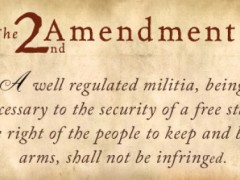Ann Coulter recently expressed moral outrage that the idiom “global warming deniers” (and by implication “climate change deniers”) was like comparing those who deny the Holocaust to those who deny Climate Change. And then a few days later, Paul Krugman referred to “inequality denial.” He was indirectly responding to Bill O’Reilly’s comment on Fox News that the emphasis on inequality was “a fraud.” Was Krugman making another allusion to Holocaust deniers too?
The rhetorical war on both sides over the meaning of both language and facts got me thinking. Is the word “deniers” now so associated with the word Holocaust that you can’t use it without such an allusion? I hadn’t thought about the association before, although, now that Coulter has alluded to it, one could argue that the association now exists even if it didn’t exist before. But then maybe the association is Coulter’s fault, more than the language that was being used originally.
But what if Coulter is right? What if the word “deniers” carries allusions to the term Holocaust deniers? A quick unscientific survey on the Internet finds that recently the word “denier” is most often associated with those who reject climate change. One can also find the term to describe those who “deny evolution” and those who “deny God,” in addition to denying the Holocaust. I’m sure there are others, as this was not an exhaustive search. At issue in general is whether the term “deniers” always evokes the association to Holocaust deniers or only in certain contexts? Depending on the answer to that question, we can ask whether the term is appropriate to describe those who deny the human origin of climate change.
The evocation of “Holocaust deniers” is of course emotionally charged in all sorts of way. The term arose to refer to those who deny that the Holocaust happened after the fact, and deny the preponderance of evidence to the contrary. That denial, of course, is morally repugnant, not just because it blatantly denies what almost everyone recognizes as self-evident facts but also because by doing so it denies the incomprehensible evil represented by the events. The term “denier” captures both dimensions: denial of the blatant facts and moral outrage over the denial. “Denial” also can carry with it a psychological meaning too, implying there are other emotional reasons why a person can’t recognize what is true. A person is said “to be in denial.” Holocaust denial, of course, can also be a part of anti-Semitism and some Jews would argue to be a Holocaust denier is to be an anti-Semite, by definition. Let’s not get into that discussion here.
Of course the term Holocaust denier arose because the term “deny” carries such great implications. According to Merriam-Webster “deny” means: 1) to declare untrue <deny an allegation> 2) to refuse to admit or acknowledge : disavow <deny responsibility. And denial is “a statement saying that something is not true or real…and when used related to psychology : a condition in which someone will not admit that something sad, painful, etc., is true or real.”
The question is whether any use of the term “denier” necessarily evokes the concept of the Holocaust denier, as Coulter suggests, and if so, how problematic is such an allusion?
For the majority of us who are convinced that the climate change is happening and that it is a human initiated phenomenon, it is arguable that the denial is morally disturbing and deeply problematic. Why do I say that?
The effects of climate change could be and seem likely to be devastating for the future human population and will fall unevenly on those who lack the resources to protect themselves from the effects. (Thus, climate change and inequality will intersect). Those of us who have become convinced by the consensus of the scientific community feel that we, as a generation, have a moral burden to take action but we seem unable to move beyond our own petty political squabbles and our own self-interests to seriously tackle this issue. Cheers to Obama for taking steps yesterday to implement stiffer controls on carbon emissions via the EPA.
However, instead of focusing on action, we are caught up in a debate about whether it is true or not that climate change is happening, whether it is caused by human beings, and whether the United States can impact the situation by doing anything about it. This debate is entangled in and symptomatic of a much broader complicated debate over the meaning of government and liberty in a free society. What else should we call this denial of scientific consensus and the moral obligation that arises from it, if not denial?
Merriam-Webster offers the following synonyms for the term deny : contradict, disaffirm, disallow, disavow, disclaim, disconfirm, disown, gainsay, negate, negative, refute, reject, repudiate. But I can’t see a way to make a better noun than “deniers” out of them. Can you? If Coulter has better language to capture the moral horror we feel that we can’t act on the scientific consensus, I’m all ears.
So I’m willing to live with the possible association that Coulter finds to Holocaust deniers, though I don’t think that association is necessarily implied by the term nor is such an analogy the point of the language. Still, I think “denial” is the best term to capture the blatant rejection of the scientific consensus and the moral obligation incumbent on us that arises from those scientific conclusions. What terms do you suggest?




